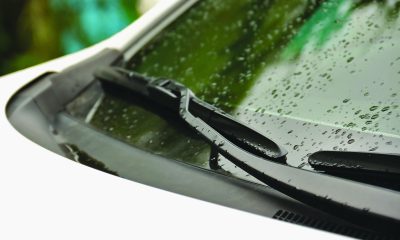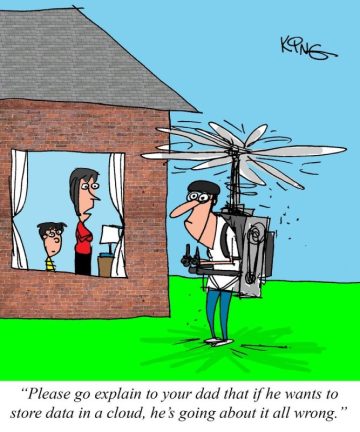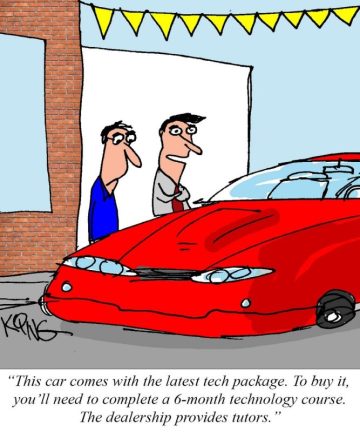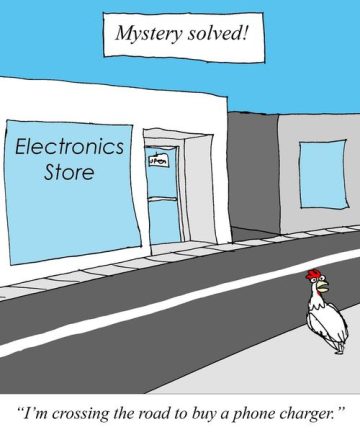Automotive
How to choose the right mechanic
If your car needs a tune-up, it can be difficult to find a mechanic you trust. Whether you turn to a dealership, private mechanic, or franchised repair shop, you should inquire about the following:
• Warranty options
• Available automotive equipment
• Hours of operation
• Services offered
• Hourly rates
• Environmental practices
• Employee training and qualifications
Additionally, it’s a good idea to read customer reviews to see if there are any complaints about the shop.
Whether you speak directly with the mechanic or a member of the front desk staff, make sure they take the time to clearly explain what’s going on with your vehicle. It’s a good sign if they can tell you which repairs must be done immediately and which ones can wait. If the person you speak with can’t be bothered to explain everything to you in detail, you may want to try another shop.
Is your vehicle still under warranty?
Even if your car is still under warranty, you can go to any mechanic for basic maintenance tasks like oil changes. Just make sure you follow the standards outlined in your owner’s manual. However, keep in mind that only dealerships can honor warranties. They’re also the most knowledgeable about mechanical issues and recalls that could affect the make and model of your specific vehicle.
Even if you trust your mechanic, you may be better off hiring a specialist to repair your windshield, muffler, transmission or air conditioning.
Automotive
Gear Up for Summer: Why Spring AC Check-Ups are a Must for Your Vehicle
With spring painting our days with vibrant flowers and stretching the sunlight longer, it’s easy to revel in the beauty and forget about the impending heat wave that summer promises. Yet, this is the perfect time to turn our attention to an often-overlooked aspect of our vehicles: the air conditioning (AC) system. Ensuring your car’s AC is in prime condition before summer’s peak is not just about comfort; it’s a crucial step in preventing costly repairs and ensuring a pleasant driving experience through the warmer months.
Beat the Heat: The Importance of Early Inspections
Spring’s moderate temperatures make it an ideal time to test and inspect your vehicle’s air conditioning system. This proactive approach allows you to identify and address hidden issues, ensuring your AC is ready to perform when needed. Without this crucial check-up, you might find yourself facing uncomfortable and potentially unsafe drives in the sweltering summer heat when high temperatures and humidity make a working AC not just a luxury but a necessity.
Stay Alert: Recognizing AC Warning Signs
Pay close attention to how your car’s air conditioning performs as the weather starts to warm. Odd smells, unusual noises, or a decrease in cooling efficiency are not just minor inconveniences; they can signal deeper issues within your AC system. Addressing these warning signs promptly in the spring can save you from more significant problems, ensuring your air conditioning is efficient and effective when the summer heat hits.
Proactive Care: Simple Steps for AC Maintenance
Maintaining a healthy AC system doesn’t have to be complicated. Regularly cleaning or replacing air filters can substantially impact your system’s performance. Additionally, a professional check-up can go a long way in preventing future issues. These preventive measures help avoid bigger, costlier problems and ensure your AC runs smoothly, keeping you cool and comfortable all summer.
Peace of Mind: Schedule Your Spring AC Check-Up
Don’t wait for the summer scorcher to realize your AC needs attention. Making an appointment with a trusted mechanic this spring can give you peace of mind, knowing your vehicle is prepared to provide a cool and comfortable driving experience, no matter how high the mercury rises.
Automotive
Spring Into Clean: Refresh Your Car Post-Winter
As we bid farewell to the cold and welcome the warmth and renewal of spring, it’s the perfect time to show your car some much-needed love. The winter months can be harsh on your vehicle, leaving behind a trail of salt, sand, and chemicals that threaten to mar its appearance and corrode its parts. Here’s how you can rejuvenate your car inside and out, ensuring it shines brightly under the spring sun.
Exterior Care: Wash Away the Winter
A thorough exterior wash is the first step in your car’s spring revival. The remnants of winter—salt, sand, mud, and de-icing agents—pose a significant risk to your car’s bodywork and metallic components. These elements can accelerate rusting and degrade the paintwork, leading to costly repairs down the line.
- Use the Right Products: Always opt for cleaning solutions specifically designed for automotive use. These products are formulated to be gentle on your car’s paint and protective coatings, ensuring a clean finish without damage.
- Don’t Forget the Hidden Spots: Areas such as the inside of the wheel wells and undercarriage often harbor the most grime and are crucial in preventing rust. Paying attention to these less visible spots can go a long way in preserving your car’s integrity and appearance.
Interior Maintenance: A Clean Start
After the exterior, turn your focus inward. Your vehicle’s interior has likely accumulated its fair share of winter’s dirt and debris, not to mention the potential for unpleasant odors to have taken root.
- Vacuum Thoroughly: Begin with a comprehensive vacuuming session, reaching every nook and cranny. Floor mats, seats, and hard-to-reach areas beneath the seats can collect a surprising amount of dirt and need special attention.
- Choose Appropriate Cleaners: Use cleaning agents for the various surfaces inside your car, such as leather, fabric, and plastic. Each material requires a different approach to effectively remove grime without causing damage.
Why It Matters
Spring cleaning your car isn’t just about aesthetics; it’s a preventative measure that extends the life of your vehicle and helps maintain its value. Regular cleaning removes potentially harmful residues and ensures that your car remains in top condition, saving you from future headaches and expenses.
For the best results, equip yourself with quality products from your local automotive retailer, where you can also seek expert advice tailored to your car’s specific needs.
Automotive
The True Cost of Buying a Car: What You Need to Know
Buying a car is a rite of passage for many, symbolizing freedom and independence. However, the ease of purchasing a vehicle often overshadows the significant financial commitment involved. Understanding the full cost of car ownership is crucial for anyone considering this major financial move.
Down Payment and Financing Costs
The standard down payment recommended for a car is 20 percent, according to Kelley Blue Book. While many buyers opt for a smaller down payment, doing so can increase the overall cost of the car due to financing. A report by Go Banking Rates highlighted that, on average, car buyers in 2023 incurred $1,253 annually in financing costs. Over a five-year loan period, this adds up to a substantial $6,265.
Insurance Expenses
Car insurance is another significant expense. For a driver under 65 years old, with six years of driving experience and a clean record, the average annual cost for full coverage is $1,765, based on data from AAA. Additionally, GAP insurance, which covers the difference between the car’s value and the loan balance in case of an accident, can add up to $700 to your annual expenses.
Fuel Costs
Fuel costs are also a major factor in the overall expense of owning a car. According to AAA, the average price of gas is $3.99 per gallon, drivers spend approximately 16 cents per mile to keep their cars running.
Maintenance, Tires, and Repairs
Maintenance is an unavoidable aspect of car ownership. On average, drivers spend about 10 cents per mile on maintenance, tires, and repairs over a five-year period. This maintenance cost is crucial to keep the car in good working condition but adds to the total ownership cost.
Depreciation
It’s important to remember that a car is a depreciating asset. The average vehicle loses $4,538 in value each year, amounting to $22,000 over five years. This significant depreciation underscores that cars are not investments in the traditional sense.
Making a Smart Purchase
Despite these costs, for many, having a car is a necessity. The key to making a wise financial decision lies in choosing a car that truly meets your needs and budgeting for the total cost of ownership. Paying as much as possible upfront and selecting a vehicle that aligns with your requirements can mitigate some of these expenses, making car ownership more financially manageable.
Understanding these costs can help prospective car buyers make informed decisions, ensuring that the joy of driving doesn’t turn into a financial burden.
Automotive
Keeping Your Vehicle in Peak Condition: The Wonders of Well-Inflated and Balanced Tires
When it comes to ensuring your vehicle runs smoothly and efficiently, one aspect that shouldn’t be overlooked is the condition of your tires. The benefits of maintaining well-inflated and perfectly balanced tires are extensive, affecting everything from fuel efficiency to safety. Let’s dive into why this aspect of vehicle maintenance is so crucial.
Importance of Proper Tire Pressure
Regularly checking your tire pressure is a simple yet effective way to enhance your driving experience. With a reliable pressure gauge, you can ensure your tires are inflated according to the manufacturer’s recommendations, ideally once a month. The repercussions of neglecting this are twofold:
- Underinflated Tires: Riding on tires that lack the proper amount of air can lead to premature wear, decreasing their lifespan. This not only affects your wallet due to more frequent replacements but also diminishes fuel efficiency and compromises your vehicle’s stability, making for a less secure and more costly driving experience.
- Overinflated Tires: On the flip side, too much air in your tires can be just as detrimental. Overinflation reduces the tire’s grip on the road, resulting in longer braking distances and a less stable drive, especially noticeable in adverse driving conditions.
The Role of Tire Balance
Another key factor in tire maintenance is ensuring they are balanced. This is crucial whenever you get new tires, have suspension work done, or notice unusual vibrations while driving. Properly balanced tires distribute your vehicle’s weight evenly across all four wheels, leading to a smoother ride by minimizing bumps and jolts. This not only extends the lifespan of your tires but also protects other vital components like the suspension, saving you money on potential repairs.
Balanced tires also improve road grip, contributing to a safer and more enjoyable driving experience. Whether it’s navigating through rain or taking a sharp turn, the stability offered by well-balanced tires can make a significant difference.
Final Thoughts
Maintaining the proper pressure and balance of your tires is an integral part of vehicle care that offers numerous benefits, from improved safety and performance to reduced maintenance costs. For the best results, consider visiting a reputable mechanic who can provide expert services and advice. Remember, a little attention to your tires can go a long way in ensuring happy and safe driving.
Automotive
5 Essential Tips to Shield Your Car’s Interior from Summer Heat
Automotive
Spring Into Action: Essential Car Fluid Checks for a Smooth Ride This Spring
Spring is in the air, and with the warmer weather rolling in, it’s the perfect time to give your car the TLC it deserves. Seasonal changes can take a toll on your vehicle, making spring maintenance crucial to ensure it runs smoothly and safely through the summer months. One key aspect of this routine check is monitoring your car’s fluids. Mechanics emphasize the importance of this step, so let’s dive into what you need to keep an eye on:
- Coolant: As temperatures rise, the risk of your engine overheating does, too. Coolant, also known as antifreeze, plays a pivotal role in keeping your engine at an optimal temperature. Make sure your coolant levels are sufficient, and the fluid hasn’t deteriorated.
- Engine Oil: Your engine’s oil is its lifeblood, providing the necessary lubrication for all moving parts. Dirty or low oil can lead to increased friction, causing wear and tear. Adhere to your vehicle manufacturer’s guidelines for oil changes or top-ups.
- Brake Fluid: The integrity of your brake fluid directly impacts your ability to stop your car effectively. Keep it clean and at the recommended level. Any signs of leaks or degradation should prompt a visit to a mechanic for a professional evaluation.
- Power Steering Fluid: Smooth steering is facilitated by power steering fluid. To avoid steering difficulties, promptly address any leaks or low fluid levels.
- Windshield Washer Fluid: Good visibility is non-negotiable for safe driving. Ensure your windshield washer fluid reservoir is filled with the appropriate seasonal fluid to clear away debris or residues effectively.
- Transmission Fluid: For those with automatic transmissions, maintaining the correct level of clean fluid is essential for proper operation. This often-overlooked check can prevent costly repairs down the line.
Scheduling a visit to your mechanic for comprehensive spring maintenance, including a thorough fluid check, can extend your car’s lifespan and ensure it’s in top condition. Embrace the warmer days ahead with confidence, knowing your vehicle is prepared for whatever the road brings.















































































